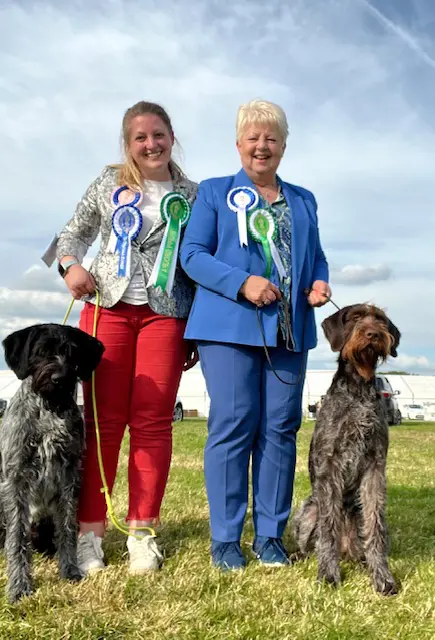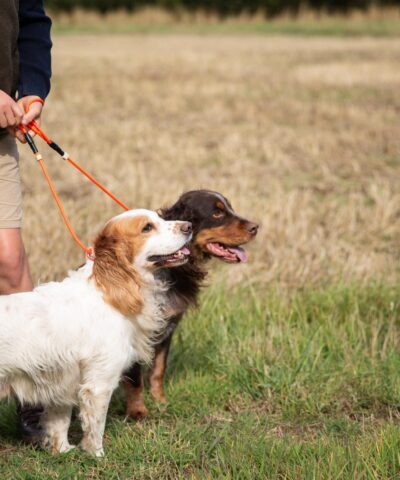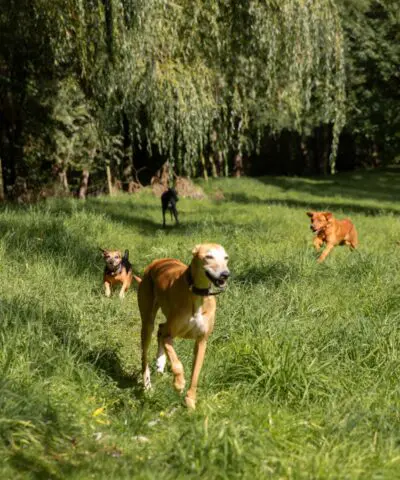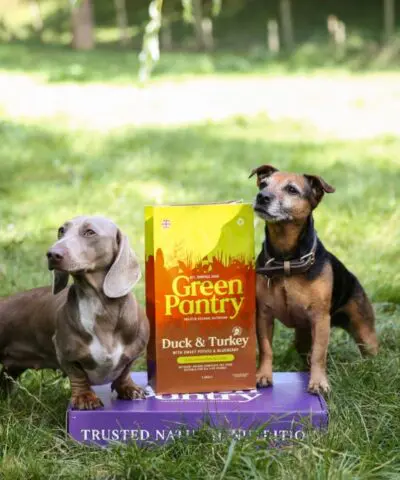Elaine and Alice Turnbull, a Mother/Daughter duo spend most of their weekends at dogs show up and down the country with their German Wirehaired Pointers, Flix and Xander. Having previously bred a number of litters with other breeds, they now spend their time in the dog show scene.
How did you end up showing your dogs?
Mum started showing dogs as a teenager when a dog walker approached her and told her that her Dobermann dog was of show quality. Having no understanding of how a dog show worked, she and her family entered every class available, signed up to the breed club and caught the dog show bug, all in one day!
I’ve been going to dog shows ever since I was born, but you are not allowed to start handling dogs until the age of 6, by that time we had moved across from Dobermanns to Giant Schnauzers, both breeds form part of the Working Dog Group.
Having bred from our Giant Schnauzers, at one point we had Grandmother, Mother and daughter in the house, we sadly were not able to breed from our younger girl, so we moved to German Wirehaired Pointers, also part of the Gundog Group. German Wirehaired Pointers (GWPs for short) are dogs which are bred for Hunting, Pointing and Retrieving (HPRs), this primary role is to search any type of terrain, locate, stop and indicate game and retrieve injured or dead game.
A natural pointer, the GWP is also an excellent retriever, waterfowl and blood tracking dog and of course, intended to be a well adjusted family dog also.
Having owned the breed since 2001, we currently own Flix, a 4 year old female and Xander, a boy who is only 23 months old.
What do you like best about dog shows and how do they work?
Dog shows run all year round and in all weathers, however the main show season runs from April to September with the end goal being to qualify and compete at Crufts in March (the end of the show season and the biggest dog show in the world). Crufts is the pinnacle dog show and it is an accolade to qualify to compete there or better still win there!
In order to become a judge, you have to take a number of exams, pass a number of qualification levels, and be mentored and able to assess dogs correctly. Dogs are judged against their breed standard, created by Breed Clubs and the Kennel Club. The judge accesses your dog against their interpretation of the breed standard, so it is entirely subjective.
As Alice has been showing since the age of 6, within the Young Kennel Club, a part of the Kennel Club aimed for children aged 6-24, she has grown up competing with those of similar ages to herself and therefore has formed incredible friendships along the way. For Elaine, the best part is also the social aspect. As the GWP is a numerically small breed, they often see the same people every weekend, becoming close friends and getting to really know the dogs. Yes, it is still a competition, and yes it is a competitive sport with people wanting to win, but for them, it’s a friendly rivalry and they ALWAYS take the best dogs home!
“When people ask us, what happens when you win, do you win prize money? We just laugh”, they said. For us, dog shows are a hobby, our dogs are pets first and foremost, with showing our dogs being an add on. We make no money showing, in fact, all we win is a certificate and a rosette, but for us, that is enough. We love dog shows as a hobby and so do the dogs, they definitely know when it’s the morning of a dog show!

And what about breeding dogs? What should people looking to buy a puppy consider?
First and foremost, our dogs are pets and we have never churned out large amounts of puppies as it is such a huge responsibility. As a breeder, we have an obligation to those dogs for the rest of their lives and would rather take a dog back and rehome ourselves than see it end up in a large rehoming facility. On one occasion, we took back and rehomed a 10 year old dog as sadly the owner had become unwell and couldn’t care for it anymore.This is what we do as a breeder, without a second of doubt, dogs are for life!
Do your research thoroughly beforehand. You really cannot research the breed enough before you think about getting a puppy. We strongly suggest, Meet and greets, Discover Dogs at Crufts, Going to Dog Shows, Agility meets etc, discuss with local specialists like vets or groomers. Of course, all breeds of dogs, and dogs themselves have their own personality, their own traits, so you want a breed that will suit your lifestyle.
Choose a breeder on credentials and not the location. We travelled twice from Plymouth to Darlington to find our first GWP and that is the right thing to do, for the right puppy.
Get into the details on the health tests. The Kennel Club and Breed Clubs have specific requirements for health testing. These tests vary per breed and are not always carried out by a local vet, but rather a specialised vet. Speak to the Breed Secretaries, and the Kennel Club and ensure you know which health tests are required for that breed. Only talk and discuss potential puppies with breeders who have the certificates of those tests, as this means they are conscientious breeders who care about the health and wellbeing of the breed and their breeding line.
Go back to the breeder. If you ever feel like you can no longer care for your dog properly, have issues or concerns, then speak to the breeder first. Don’t look to rehome yourself. Always ask the breeder.
What tips do you have for helping dogs look and feel ‘show ready’ standard?
The right food is critical to ensuring that all dogs live a healthy and happy lifestyle. Food affects everything from coat, skin and overall wellbeing. For us, both our dogs are fed on Green Pantry. The reason we moved from the larger food brands to a smaller independent company was initially how the food was affecting our dogs. One sign was poor digestion and bad flatulence. We knew it wasn’t a good sign, so we did a lot of research into what actually goes into the production of dog food and wanted a more holistic and natural food option. A food which we could trust, real protein with no processed or artificial ingredients.
Good exercise also goes hand in hand with good nutrition and that can vary by breed. Our dogs need a minimum of 2 hours a day of exercise and that doesn’t just mean road walking but being able to run loose and explore. They need to be mentally stimulated or they go stir crazy just sitting in the house.
Grooming is also incredibly important. This again varies from breed to breed but regular coat brushing, dental care and clipped toenails are vitally important as a starting point.
Like anything, showing dogs requires practice. They are expected to stand still in a single position whilst a stranger (the judge) checks their teeth and overall confirmation. In order for our dogs to be happy and be handled and stroked, we attend regular dog training and ring craft classes so they can learn from a young age the routine of what happens in the dog show ring, this means they are not overwhelmed when they step into the ring for the first time.





